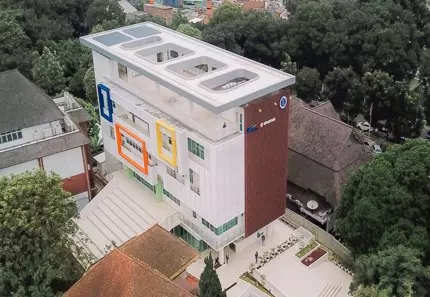Program Studi Pendidikan Bahasa Inggris - S3
Lihat Data Dosen

Program Studi
- Tanggal SK: 27 September 2023
Kadaluarsa: 30 September 2027
Akreditasi: Unggul
Status: Aktif - Tanggal SK: 2 Juni 2020
Kadaluarsa: 31 Mei 2025
Akreditasi: A
Status: Tidak Aktif - Tanggal SK: 30 Mei 2015
Kadaluarsa: 30 Mei 2020
Akreditasi: A
Status: Tidak Aktif - Tanggal SK: 30 Oktober 2009
Kadaluarsa: 30 Oktober 2014
Akreditasi: A
Status: Tidak Aktif
(27-09-2023)
Pendidikan Bahasa Inggris - S3
Universitas Negeri Malang
(01-01-1976)
(22-03-2011)
Kota Malang
Prov. Jawa Timur

Tentang Pendidikan Bahasa Inggris S3 - Universitas Negeri Malang
The Doctorate Program in English Language Education (ELE) has been contributing to the development of English Language Education and scholarship in Indonesia for over forty years. In such a way, it has been contributing to the development of ELE globally through both activities such as seminar and other academic and professional fora.
The Department of English was founded in 1954 as the Department of English Language and Literature. Since then, it has undergone several changes, both in terms of the curriculum and its identity. In 1968, the Institute for Teacher Training and Education, Malang (at present Universitas Negeri Malang) initiated higher education for Doktorandus to obtain a doctoral degree through the Doctoral Program (Strata 3 or Ph.D.). The establishment of the Doctoral Program was based on the regulation of the Minister of Higher Education and Science no. 19, dated July 20, 1962.
In 1980, the graduate program was split into Doctoral Degree (S3 or Ph.D.) Programs and Masters Degree (S2 or M.A.) Programs. Accordingly, Universitas Negeri Malang started to offer Masters Degree Programs in Education (1980), pursuant to the Presidential Decree of the Republic of Indonesia No.60/1982, dated September 7, 1982 and the Doctoral Study Programs were officially converted to the Masters and Doctoral Programs (PDP). One year later, with the Decree of the Ministry of Education and Culture No. 0146/0/1983, dated March 5, 1983, the PDP was changed to the Graduate Faculty. Subsequently, with the Government Regulation N0. 30, 1990, the Graduate Faculty was further restructured from Faculty to Program, with the new name of Graduate Program.
The Program has been home to reputed tenured faculty members with a wide range of contributions through a number of roles they play at the local, national, and international arenas. Some of the faculty members and graduates have made their contributions through their appointments at the SEAMEO RELC and universities in Japan and Australia. Some others have been external reviewers and examiners for promotion to professorship and examiners of PhD thesis across Australia and Asia.
Taking into account recent trends and policies, the curriculum of Ph.D. in ELE is developed in view of the capability of the graduates in the gamut of ELE and the research capability within the discipline and the ensuing ability to disseminate and communicate their capability to the relevant discourse community and community in general.
Visi Program Studi
The Doctorate (Ph.D.) Program in English Language Education (ELE) provides innovative research-oriented education in view of global developments and future situations in ELE to support excellent stature of Universitas Negeri Malang in 2030.
Misi Program Studi
The Doctorate Program in ELE is responsible for enhancing, with the spirit of local, national, and international collaborations, the Threefold Missions of Higher Education (Tri Dharma Perguruan Tinggi) encompassing education, research, and community services by:
1) carrying out effective student-centered doctoral education in the field of ELE,
2) promoting research in the field of ELE for the development of knowledge and profession, and
3) conducting community services in the field of ELE for the empowerment of the community.
Kompetensi Dasar Program Studi
Pursuant to the Indonesian Qualification Framework (KKNI) and verse 5 of Permendikbud No 3, 2020, three points of Learning Outcomes of the Doctorate (Ph.D.) Program in English Language Teaching are formulated as follows:
1. Mastery of the philosophical bases and theories of ELE
2. Capability to rigorously carry out innovative research in the gamut of ELE in view of international publishability and contributions to the society.
3. Capability to communicate nurtured thoughts and research results to the wider community both through academic fora (oral and written) and community services.




